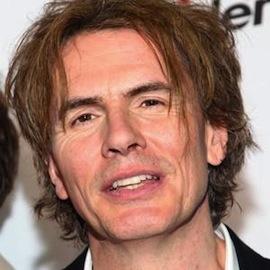 As regular readers know, although I do occasionally partake in journalism I don’t consider myself a journalist. When I do get to interview people it’s always because I want to, because they mean something to me. As such I don’t feel duty bound to toe any editorial line and I try to ask questions that the subject may not have been asked that day. In John’s case, he was in the middle of an extremely intense PR tour for his Autobiography (reviewed by me elsewhere). The day before we spoke he was on the trash TV program ‘Loose women’. The interview was all the expected, usual and predictable questions. I thought I’d give JT some relief by banging on about subjects he wasn’t likely to come across elsewhere….like Japan. (the group). I did however, maybe go a bit far and JT seemed a bit thrown by me at times. There was also a problem with the phone line and I got the feeling JT couldn’t always understand me, a matter not helped by my Cardiff accent… As regular readers know, although I do occasionally partake in journalism I don’t consider myself a journalist. When I do get to interview people it’s always because I want to, because they mean something to me. As such I don’t feel duty bound to toe any editorial line and I try to ask questions that the subject may not have been asked that day. In John’s case, he was in the middle of an extremely intense PR tour for his Autobiography (reviewed by me elsewhere). The day before we spoke he was on the trash TV program ‘Loose women’. The interview was all the expected, usual and predictable questions. I thought I’d give JT some relief by banging on about subjects he wasn’t likely to come across elsewhere….like Japan. (the group). I did however, maybe go a bit far and JT seemed a bit thrown by me at times. There was also a problem with the phone line and I got the feeling JT couldn’t always understand me, a matter not helped by my Cardiff accent…
John Taylor interview
JT: Hello?
AR: Hello, John?
JT: (Obviously reading from Schedule) ‘Anthony’.
How are ya?
AR: Alright….You?
JT: Godgoodgoodgood…..
AR: How long have we got?
JT (emphatically) Twenty minutes.
AR: Ok. Right. Just to give this a bit of context, my first 12” was ‘Planet earth’.
And. There’s a pun in there somewhere…a Double-entendre...
JT (silence).
AR: ?
JT: Hang on a min’ Anthony… (Goes offline to speak to someone else).
AR: OK.
JT ‘jhfjghkjg’…., ha, yeah, and your accent really helps that too…
AR And...Uh…I mean I bought that long after it came out, in ’85 but, more importantly it got me into Japan.
JT: What?
Are: Japan. The group. Japan.
JT: (The penny drops, perhaps he thought I meant the ‘Night version’ had got me into the country). Ah, right, yeah, yeah, yeah….’
AR: And it uh…kind of awoke my whole aesthetic, you know? So thanks for that.
JT: Glad to hear it. You’re welcome!
AR: You were a fan of that group too, right?
JT: Japan?
AR: yeah.
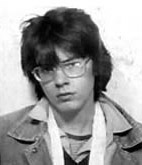 JT: yeah, definitely, they changed my uh…uh...they changed….um...changed…my direction a little too…it...they...were in that Post-punk interzone…when it was clear that the aggressive…you know…that the Clash…it was...and...You know, I loved the Clash but…there was a certain amount of bands that were following in that kind of direction….led by The pistols and the Clash…and it was getting a bit tired you know, quite quickly…so one was looking in other directions to see what was happening…that was kind of interesting…and Japan were one of the bands that I went to see…in ‘78…at Barbarellas. I saw them on the ‘Obscure alternatives’ tour. JT: yeah, definitely, they changed my uh…uh...they changed….um...changed…my direction a little too…it...they...were in that Post-punk interzone…when it was clear that the aggressive…you know…that the Clash…it was...and...You know, I loved the Clash but…there was a certain amount of bands that were following in that kind of direction….led by The pistols and the Clash…and it was getting a bit tired you know, quite quickly…so one was looking in other directions to see what was happening…that was kind of interesting…and Japan were one of the bands that I went to see…in ‘78…at Barbarellas. I saw them on the ‘Obscure alternatives’ tour.
AR : Oh, so you got into ‘em before ‘Quiet Life’ which is seen as the ‘start’ of Japan in Some ways…?
JT : Oh, I loved Obscure alternatives. So, yeah this was pre- ‘Quiet life’ and I hadn’t seen …you know I’d been going to a lot of gigs and I’d seen a lot of bands in that room. But, you know, I hadn’t seen anything with a rhythm section like that, you know? And I just loved it. And I didn’t know the first album, you know? And they played ‘Television’ and ‘Suburban love’ and it was music to my ears, you know? And..I’m just thinking if…if that was just about the time I was starting to play bass, you know? So I was starting to think about a rhythm section. And punk wasn’t about that it wasn’t rhythm section orientated…
AR : It was energy and attitude orientated more than anything, it seems to me…?
JT : Punk?
AR : Yeah.
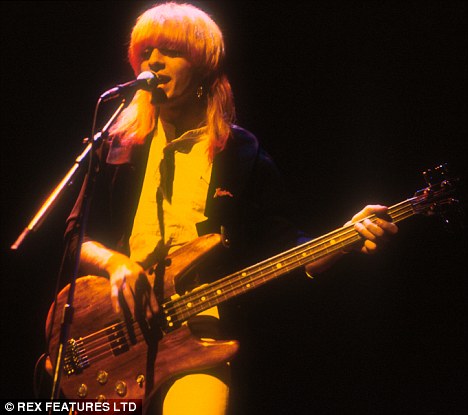 JT : (Unsure but too polite to openly disagree). Umm..Yeah..Yeah…there was a naïveté to it that was really …but…then the Pistols made great records. And the Clash were the band that I saw again and again and again…I mean, I liked Sousixe and the banshees too… JT : (Unsure but too polite to openly disagree). Umm..Yeah..Yeah…there was a naïveté to it that was really …but…then the Pistols made great records. And the Clash were the band that I saw again and again and again…I mean, I liked Sousixe and the banshees too…
AR : Another band with a great drummer…
JT : Which one?
AR : Budgie.
JT : No, I never saw them with Budgie. I saw them with Kenny Morris. ..Which was…you know I never saw them after he quit. You know he…I saw them on the ‘Scream’ tour. ..Where the drummer and the guitarist just walked off the tour….right toward the end…and by the time they came back I was kinda busy doing my own thing…
AR : Japan were partly unique because they were untutored…I remember the first time I heard Mick’s playing, you kinda think..’Wow, that’s what I’d like the bass to sound like if I played it’ and of course you try and it sounds terrible, nothing like him…
JT : I think there was some tutoring.
AR : …Yeah…?
(Mick was very open about his lack of formal musical training and in fact was almost ‘proud’ of it, saying he never learnt the names of the notes on his bass).
JT : Yeah..No? He played the saxophone too and you can’t play an instrument like that unless you’ve got a little bit of formal training…I think. But I may be wrong. I’ve been listening to a lot of Jaco Pastorius recently and I can really see where he’s coming from. And I really loved Steve (Jansen’s) drumming style. I really loved his playing.
AR : Yeah, it sounds so composed…
JT : You know who else is really good at that? Dave Grohl. And Stewart Copeland. They’re really drummers who play the song. And I like that, yeah.
AR : That was the beginning of an interesting era because obviously Roxy and Bowie were huge influences on Japan and Duran Duran and yet both Bowie and Roxy were still very active and…
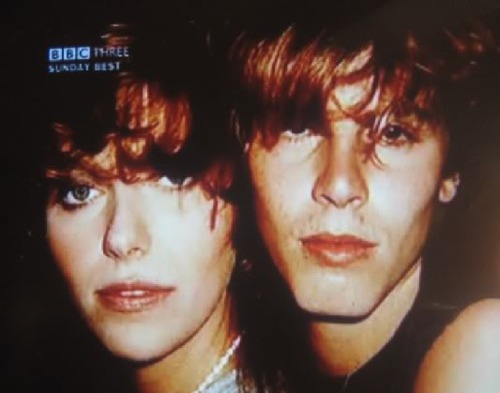 JT : Um, that’s a different era actually. JT : Um, that’s a different era actually.
AR : Yeah?
JT : Yeah, if we’re talking Japan we’re talking post punk, ’78- ’80 and that’s a different era to Roxy…
AR : I’m saying we’re talking about an era where groups are really influencing groups that…
JT : Influencing me?
AR : Yeah.
JT : You’re talking of groups that I was influenced by?
AR : Yeah, what I’m trying to say is that there were a lot of groups influenced by Roxy, Bowie and Eno’s solo records and even Ronson and….it was all so quick..I mean…I’m trying to figure out the comparison that would be relevant today where groups are influenced by groups who are in themselves still doing some of their best works. So you have the influencer and the influenced kind of operating at the same time, if you see what I mean…it was a unique period in that sense...like the groups influenced were superseding their inspirations who were still, in their own right making great records. Do you know what I mean?
(I phrased this observation very badly and no wonder JT was confused).
JT: But Japan had some other colours in there I think, you know? Actually the way the keyboard player…you know, they had Kool and the gang in there…and…a song like ‘why did you do it’ by Stretch. And Heatwave. There was a few English soul bands of the early 70’s and I can hear that in Japan.
AR : That is true for that period. They were into Hall and Oates early on, too, actually…
JT : Ahhhh…interesting!
AR : …but they dropped that kind of sound when…
JT : Duran Duran came along! Ha ha ha..
Ar : Aheh…
JT : I mean, it was about taking control, wasn’t it? I mean… I mean …’Tin Drum’ was an extraordinary record…
Ar: So you liked the later stuff too?
JT: You mean the later Sylvian stuff?
AR: …The later Japan stuff…
JT: Well I Loved the ‘Art of Parties’. Did they make an album after Tin Drum?
AR: Not as such…
JT: I Love ALL the Japan albums. They are all great in their own way…
AR: And they were at Air studios when you were recording your first album there?
JT: Ummm…who is this interview for again?
AR: Ha ha...yes, quite right. Let’s move on. So. The Book. Which I liked very much.
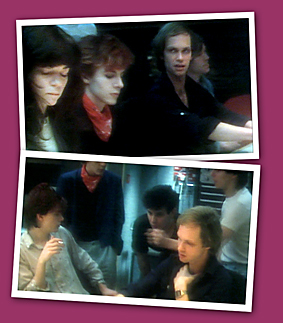 JT: JT:
AR : And uh, the …I write books too and the part I dislike most about writing biographies is covering ‘the origins’…the family….the history…
JT: (Laughs)
AR: And I was complaining about this to an editor once...you know…’Do we really need to know when His Granddad was born’ and he said ‘Ahhh, all the Charles Dickens stuff…’
JT: Ha ha...right….
AR: I love the bits of biographies when they start to lose it…about three quarters of a way through when they get into the Coke and the Brandy and start dropping babies at Christenings…
JT: Right.
AR: But I actually loved that part of your book. There was a lot of depth to it. It was very atmospheric too…I loved that line about you waking up in the morning and the first thing you heard, before anyone else, was the radio…
JT: Uh-huh.
AR: And I could really relate to that, you know? Coming from a pre-breakfast television generation…the radio was always on in the morning. I remember eating toast when I was nine and Lennon’s death was announced on the radio...Not the TV.
JT: Sure.
AR: And the end, where you speak about the death of your parents. Very eloquently put and so sad, that way, you know..? But anyway…You wrote the book quite quickly…would that be true?
Jt : Yeah..Yeah..I started last summer…(2011)..And uh…
AR : What was the impetus behind it?
JT : there was a three point impetus. One was dad dying. Coming up to the third anniversary of his passing. And selling the house that I’d grown up in and having to clear it out and finding that they’d…kept everything. And..So nostalgia started to rise and you know, and previous to that I hadn’t had time for nostalgia to rise. I don’t think I’ve been nostalgic for the area I’d grown up in until after I’d stopped going there. And uh, I’d been approached by Tom Sykes (society Diarist/writer) who I knew through his sister, Plum…I’d met him at the beginning of 2011 and he’d said ‘You know if you ever wanted to do a book I think we could do a great job ‘ and that got me thinking, ‘Hmmmmmm….’and then last summer , Simon (Le Bon) developed a throat problem and we had to cancel three months of shows. So I certainly had a lot of time on my hands. So I thought ‘OK. Let’s go for it. Let’s do it!’ And Tom was brilliant. He was just…I got bogged down a few times and he just kept me moving you know…and I think the book has got a good pace to it…which I feel we need these days…we’ve got so little time..Everyone has so little time…we’ve all got ADD anyway…so, I hope it keeps things moving…
AR : Do you read much? Are you a ‘fan’ of biographies?
JT: I used to read a lot. But ummm…I haven’t so much the last few years…
AR ; ‘cos in a way, you’re part of a new phenomena where the subjects themselves are writing their own books. Keith Richards being a best example I guess.
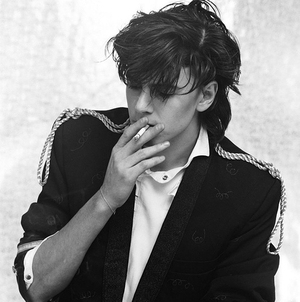 JT : Whose? JT : Whose?
AR : Keith Richards.
JT : Yeahhhhhhhhhhhh…he definitely opened the door for a lot of us but I think Dylan opened the door for Keith. I think Dylan’s was really the one that …I mean…You read an interview with Dylan and he never says anything about his…personal life. He keeps to himself, he’s a very…private man. And so I thought his biography was a …revelation. By the time I’d finished I felt I knew the man and he was really something…someone…that had been written about so many times, with other people trying to figure him out and he remains an enigma….so…I was staggered by that book and I’m also really looking forward to Neil Young’s. He’s another artist that’s been obsessively been put under the magnifying glass….by innumerable journalists but rarely says much about himself himself.
But I think that when Dylan put his book out Keith thought ‘Ya know what? If he can do it, I can do it’.
AR : One thing I liked about Dylan’s book was that he didn’t just do a straight narrative….it was non- linear…
JT : I LOVED that about it! Loved it…and almost every chapter ended with something like : ‘At some point soon I was gonna’ have to write a song about my own…but not yet’. Ha ha…
AR : I loved the bit where he was signing his first contract and instead of talking about the boring stuff like percentages etc he’s on about being transfixed by a secretary in the window of the office block opposite ….(I do pathetic Dylan impression : ‘Ehhhh..and I saw this woman..in a leopard skin..etc…’).
JT : Ha ha ha….
AR : were you tempted to write your book in a more experimental, non- linear fashion?
JT : You know what? I did and I was advised against it.
AR : Ok. Ok. Uh, I figured it must be really difficult when you’ve been famous and successful and so…public…that it must be hard to tell apart from what you’ve read and seen about yourself and what actually happened…what you actually, authentically remembered…do the two get confused?
Was that an issue for you?
JT : Welllllllll….there was a lot of evidence on the table in front of me. To keep me on track. But to be perfectly honest with you, you know what they say about not letting the truth get in the way of a good story? I mean, the opening line in the book….(reads opening lines)….’and it’s a week after my 21st Birthday….’ And already, many fans have written in to correct me, saying ‘But that’s FIVE weeks after your birthday John…’but it doesn’t really matter. That’s not the point. And anyway, anyone that knows me knows I’m not a detail orientated guy. I’m…an impressionist. And obviously there are certain details you’ve got to get right so I thought ‘Oh God, what have I let myself in for…’
AR : Sure, sure. I love that Robert Evans quote ; ‘There are three sides to every story ; Yours, mine and the truth’. So, no Biography is pure forensically…it’s also about atmosphere and dynamic and narrative…
JT :
AR : Um. I’d like to touch on the rehab thing. That really struck a chord with me because I’ve been facing some issues lately in that department…(waffles on in too much detail about those issues).
JT : the thing that was really significant for me was that I was given a diagnosis (for being an alcoholic) when really, you know, before that I just thought I was an idiot…and I hadn’t been able to understand and for years and years of making what I thought were bad choices while everyone else were being sensible or relatively sensible…and on top of those bad choices, the making of those bad choices continually over the years starts bringing the shame on. So not only am I ‘stupid’ but I’m also ashamed of myself. Because you’re involved in behaviour that you’re ashamed of.
AR : And I’ve found that that can become a cycle. The shame makes you feel bad and so then you get fucked up again to ‘get away’ from the shame. How do you break that cycle?
JT : Well, I needed the brain washing. My brain needed a good wash. And I tried to put that across in the ‘rehab’ chapter. Not so much ‘This is what I was told’, but that there was the fact that there was a tremendous amount of expertise available. And I think that equally, if you make that commitment to walk into an AA meeting, and KEEP walking into an AA meeting (laughs)…
AR ; I couldn’t stand the ‘God stuff’ they lay on you in those meetings…
JT : Yeah. I know. I know. But…it depends on how much you want it. You know they say that ‘it’s not for those that need it it’s for those that want it’. And you have to stop fighting it… you know?
|
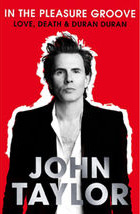
This is the original draft of my review of JT’s Book. The published version can be found here – http://www.express.co.uk/posts/view/346236/Review-In-The-Pleasure-Groove-Love-Death-and-Duran-Duran-by-John-Taylor
What do you think of when you think of Duran Duran’s John Taylor?
Frilly white shirts and burgundy hair? Cartoony videos full of yachts, champagne coloured suits and semi naked glamour girls? Snogging to ‘Rio’ at school discos? (Not me regarding the latter, I should add. It was an all boy’s school). All of the above… plus someone who in the word’s of Zoolander is ‘really, really ridiculously good looking’? As far\ as your average pub quiz contestant goes, John Taylor is an amalgamation of all of the aforementioned but it’s his good looks in particular that still hinder a deserved muso reputation as an exceptional bassist. (Which is really, really versatile and ridiculously groovy). But then almost everyone in Britain over 39 who devotedly bought Smash Hits and Number One magazine in the 80’s knows the story of Duran Duran and its gang of Le Bon, Rhodes and Taylors. (There were three of the latter at its peak. John was Taylor numero Uno, though).
What you may not know is that he also suffered a Cocaine and alcohol addiction that went on for far too long but that throughout it all – his childhood, the worldwide adoration, the addiction, the number one’s, the bond theme, the marriages’, the endless cars, the rehab - John Taylor was and remains a seemingly exceedingly likeable and decent chap with an extraordinary story to tell.
Born in 1960 and raised a single Catholic child in a working class suburb of Birmingham (albeit one named ‘Hollywood’); Taylor writes a wonderfully evocative account of both his youth and this particular part of Britain during the 60’s and 70’s. On waking every morning he recalls: ‘I would hear the radio before I saw or heard any parent…we were a Radio family’. The son of a deeply religious housewife and a soldier father who suffered three years in a German prisoner of war camp, Nigel – as he was then known – maps out an upbringing as magical and dreamlike as our own. The adolescent years in particular are a treat; with Taylor casting himself as a kind of Left banke music obsessed Adrian Mole.
It is actually this part of Taylor’s story – the pre and post Duran segments about family and home - that is most affecting. In recounting his childhood and his close yet typically English, emotionally stilted relationship with his parents, Taylor does so with a touching poignancy that while tinted by nostalgia is neither syrupy nor sentimental. It makes what comes later - the battalions of groupies, the Kilimanjaro of Cocaine, the selling out Madison Square Garden etc seem shallow and second hand by comparison. But then, as glorious and magical as Duran’s rapid rise to global success and fame was, it’s a success story now over familiar to anyone with even a passing interest in Pop mythology or with access to free view. The rise of Duran and their ilk now seems as ordinary in its mythical rise as does the inevitable decline and break up/rehab/reunion. In fact Taylor himself seems to falter during the telling of his most famous and public years, (1983-1985) as if he has confused what he actually remembers with what he and everyone else has read and written about Duran Duran. Nevertheless, the tales of cars, Coke, birds and booze is faithfully re-told from the protagonist’s perspective and not without wit and candour. Speaking of his first year as a world wide sex symbol in 1982 Taylor quips: ‘I would have had to have taken a hell of a stand, both morally and ethically not to get laid an awful lot that year’. While the narrative arc is familiar, Taylor is both modest, self effacing and just plain interesting enough to ensure there’s barely a dead page. Haunted by his religious upbringing, frustrated at his parent’s emotional reticence, and travelling the world first class high and horny throughout, we also learn that self destructive tendencies asides, John Taylor has barely a malicious bone in his long limbed body. He is unamiounisly gracious about everyone he’s ever met or worked with, from Chic through Bowie to Robert Palmer, including each of his band mates in between. He’s even genial about his ex - management and ex – Duran guitarist Andy Taylor, both of whom seem to have caused Duran ample grief at times. And what other bass player would be thoughtful enough to remark on how lucky they are that their drummer – a guy that by necessity a bassist has to spend an inordinate amount of time staring at- is blessed with a ‘non judgemental…and pleasant face’?
‘In the pleasure groove’ is not as literary in its aspirations as Alex James ‘Bit of a Blur’ and it’s lacking the detail and voice of Andy Taylor’s own autobiography ‘Wild boy’ but it’s an easy and engaging read written with style, insight and above all charm. You’d have to have a heart of stone not to warm to its author. You jut can’t begrudge the bloke any chance at happiness he’s given be it via a multi- million royalty payments or having cheekbones you could grate Tesco’s finest choice Parmesan on.
In the mid 90’s, shortly after hitting the ‘bottom’ in his drug and alcohol abuse, John Taylor sought professional help. A counsellor told him: ‘If you got sober you could really be somebody’.
He did and he is : John Taylor, AKA Nigel Mole, bassist supreme, recovering addict, sometime Pop God, and a dad three times over has quietly and inconspicuously, become one of our greatest living Englishmen.
|

